(Strand)om Stories: Thor: Gods and Deviants Review
This volume eschews traditional superhero fare for its deeper mythological roots, presenting four well-illustrated narratives which are occasionally unbalanced
—by Nathan on June 27, 2023—
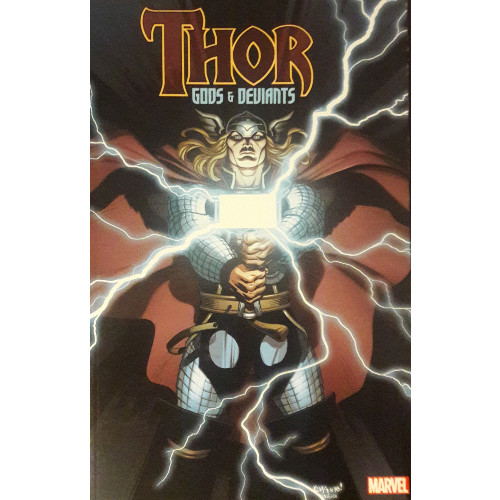
A volume long on my wish list was a small Thor trade paperback titled The Deviants Saga. Though I knew little of the story, I was aware it included the Eternals, a powerful pantheon of superhumans created by Jack Kirby and ushered properly into the Marvel Universe by Roy Thomas, Ralph Macchio, and Mark Gruenwald. During a sale at a local comic shop last August, I picked up the trade, eager to dive into a story focused on the Eternals following Neil Gaiman’s work on the team. That very same day, before I even cracked the spine, I found a listing on Amazon for a larger volume collecting not just this saga but three other series as well. I promptly returned the smaller volume (exchanging it for another trade) in favor of its more inclusive sibling.
This larger volume, containing four series scripted by Robert Rodi, feels like a nice companion to a Thor: Ragnaroks volume I reviewed a year ago today. The sizes are comparable, and even the spine and cover fonts are similar. I enjoyed the Ragnaroks volume quite a bit but critiqued it for forcing a theme which wasn’t consistently present. “Thor by Michael Avon Oeming,” as I called it, seemed a more fitting title. Likewise, “Thor by Robert Rodi” could easily be swapped for the title of this collection. Though, as we shall find, gods and deviants both flit through this volume’s pages, wielding witchcraft, sewing suspicion, and defying discord. Kingdoms fall. Planets collide. And, for a time, a certain God of Mischief (or is it Evil?) gains the crown he has so longingly sought after for millennia.
Thor: Gods and Deviants
Writer: Robert Rodi
Pencilers: Esad Ribic, Simone Bianchi, Mike Choi, Stephen Sergovia
Inkers: Esad Ribic, Simone Bianchi, Andrea Silvestri, Mike Choi, Jason Paz, Stephen Segovia, Jeff Huet
Colorists: Esad Ribic, Simone Peruzzi, Frank D’Armata, Andy Troy, John Rouch, Will Quintana
Letterers: VC’s Cory Petit, Randy Gentile, VC’s Joe Caramanga, Jeff Eckleberry
Issues Collected: Loki #1-4, Thor: For Asgard #1-6, Astonishing Thor #1-5, Thor: The Deviants Saga #1-5
Volume Publication Date: October 2017
Issue Publication Dates: September 2004-November 2004, November 2010-April 2011, July 2011-September 2011, January 2012-May 2012
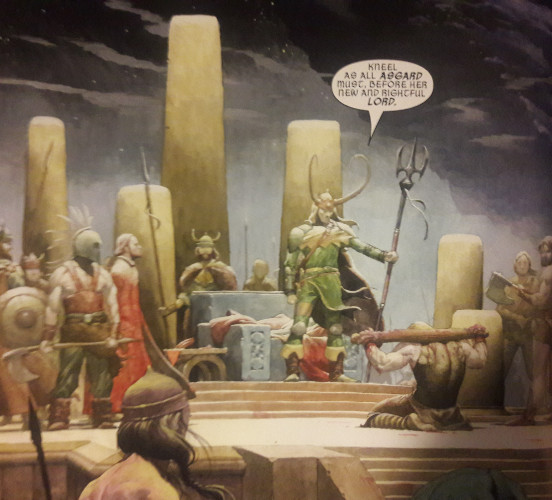
Published the same month as the Ragnaroks volume, Gods and Deviants follows the same general trend as the first collection: gathering several Thor miniseries written by the same guy into one larger collection. In that regard, I appreciate Marvel’s efforts. I enjoy volumes such as this, where several complete narratives (primarily limited series) are joined together in a singular, neat, often fairly-priced package. Instead of four slimmer trade paperbacks, I can fork over some digital cash for a somewhat bulkier volume that feels more “complete.” Plus, we’re given a full spectrum of Rodi’s Thor-based bibliography.
I am not familiar with Robert Rodi. He’s a novelist, specializing in satire. The “satire” aspect makes me raise an eyebrow, not from suspicion, but out of curiosity. That adds a new angle to his four series collected here I hadn’t considered, and though the series don’t come off as intentionally comedic or parodic, I can see a quasi-satirical layer if I peer through a particular lens. Deep beneath narratives of gods and deviants lie applicable messages primarily on authority: what does it mean to be a king, a hero, a god?
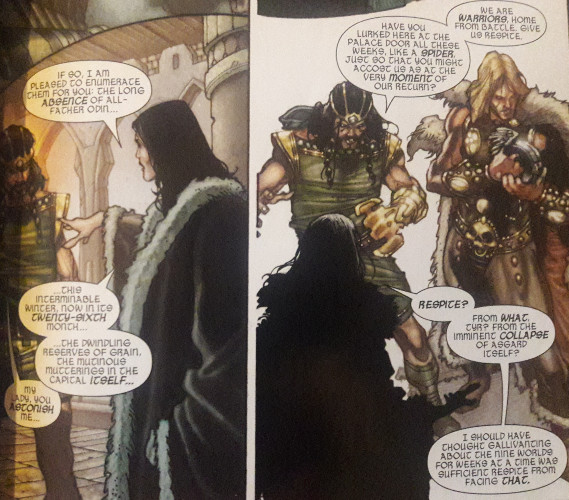
What’s most fascinating about Rodi’s narratives is that he generally tackles the subject matter from a mythological angle. Oeming, to an extent, did this as well–his Blood Oath limited series pitted Thor and the Warriors Three against several pantheons, and his “Ragnarok” story arc blended superhuman action sequences with Norse endtimes mythology. Rodi doubles down on the mythological elements; for at least two of the series, the only “Marvel” characters readers run into are the comic book embodiments of Norse gods and goddesses, such as Thor, Loki, Balder, Tyr, Hela, Heimdall, and Odin. Half the volume feels intentionally separated from its Marvel roots, with an emphasis on Norse lore rather than superhuman conflicts or integrating the characters more deeply into the Marvel Universe by having them interact with the Avengers or mingling with the Enchantress or Executioner.
This extends to Rodi’s dialogue. Thor, of all Marvel’s characters, is most given to Shakespearean speeches, spouting “thou”s and “thus”s you’ll rarely find in a Spider-Man or X-Men mag (save, naturally, for a team-up with Thor). But Rodi’s dialogue ratchets the eloquence, with words and phrases twisting over themselves, often poetically, sometimes confusingly. Largely, Rodi does well with toying with sentence structure and parallel phrasing, as long as you’re able to tease the proper meanings from the words.
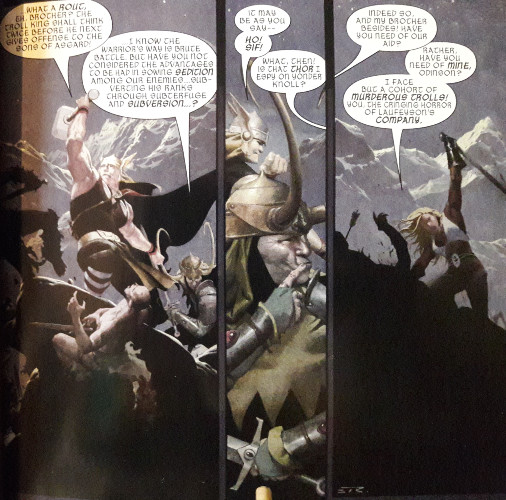
Also enrapturing is Rodi’s approach to his subject matter. Each series feels predicated on a “What If–?” style scenario, made all the more engaging as the reader works to discern where these series, with the exception of The Deviants Saga, fit into then-modern continuity (that this is a collection of comics written over eight years makes it all the more confounding). This isn’t like Ragnaroks, which was largely slotted within the time period surrounding Avengers: Disassembled. Following that, I can easily chart where J. Michael Straczynski, Kieron Gillen, Matt Fraction, and Jason Aaron’s runs are positioned. But these are four limited series, strewn across time and space. The Deviants Saga specifically references Neil Gaiman’s Eternals, so I can easily plop it after that series. But the others are more difficult, and I wonder if Rodi’s Loki series is even in main continuity.
A part of my brain would like to know where these fit chronologically and see how they’re tethered to the ever-expanding web of Marvel Universe continuity. For Asgard shows an Asgard in political/social turmoil, and Astonishing Thor and Deviants Saga indicate an Asgard in ruins–is this post-Fear Itself? I’m just not sure. Perhaps additional research will be beneficial later on, but I’ll admit that a different part of me likes not knowing–the ignorance further isolates each series, reinforces that idea that Rodi is making standalone forays into Thor’s world, not predicated on past events or goings-on in the wider Marvel Universe.
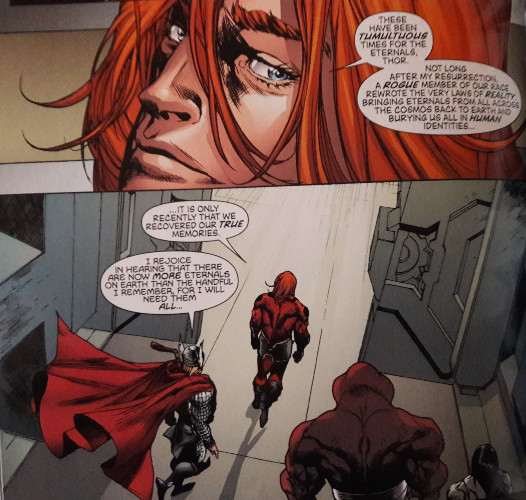
And it enhances these “What If-?” aspects I mentioned earlier. Rodi, not wholly removed from main Marvel continuity but not subservient to its whims, finds whimsy and even grandiosity in twisting Thor and his friends and enemies around his finger. Loki is predicated on a question: “What if the God of Mischief won? What if Thor’s slippery half-brother conquered Asgard?” For Asgard is based on the concept of political and social strife as Asgard’s seemingly oppressive stance against former enemies is questioned and beleaguered. Astonishing sees Thor run into one of his more bizarre opponents, Ego and Living Planet, not only learning of the sentient sphere’s true origins but uncovering the existence of Ego’s brother (I know, right?). Each story begins with a simple idea, and Rodi allows those ideas to grow, largely organically.
There is a “morality play” quality to each saga, with a central tenant to each series being what our characters learn and how they grow. Loki showcases a God of Mischief who has gained everything he has ever wanted…but is not sure if everything he ever wanted was what he really wanted all along. Rodi nicely subverts Loki’s expectations, allowing the crown to feel more like a burden than a blessing. The grandeur of the role loses its radiance once Loki becomes mired in uncertainty and the problems of Asgardian commoners.
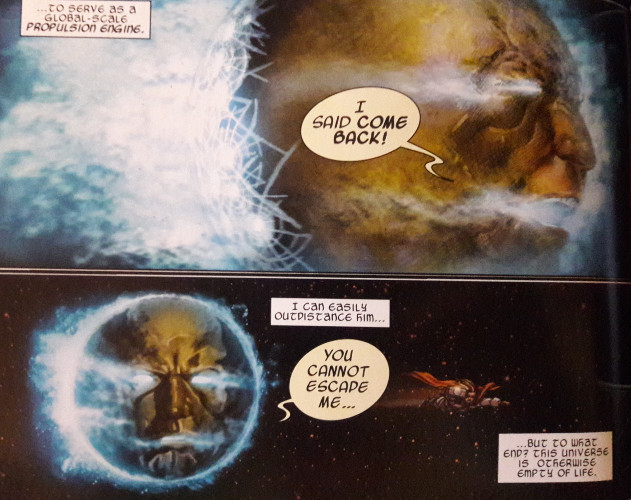
Thor reigns front-and-center in the other series, encountering friends and foes alike. Rodi explores the heaviness of the crown from Thor’s perspective in For Asgard, as the God of Thunder juggles external and internal strife and the legacy of his throne. Whereas Loki wrestles with the current responsibilities of ruler-ship, Thor struggles with the past and all the damage Asgard has inflicted on a cosmos growing discontent and a people divided. Astonishing sees our golden-haired guardian a victim of his own hubris and the machinations of others (including the Collector and the Stranger). And Deviant Saga pits Thor against a surprising ethical dilemma as he’s forced to reconstruct his perspective of the Eternals’ enemies as they seek aid, offering a complex view of the “Eternal/Deviant” conflict somewhat lost in Gaiman’s series and not seen since Peter B. Gillis’ second Eternals series with Sal Buscema.
Much like Oeming before him (and, to a greater extent, Walt Simonson before them both), Rodi takes great pains to explore the humanity of our demigodly denizens, extracting the moral/immoral qualities which allow these characters to reflect us and our own victories and defeats. Loki fulfills a dream long held, discovering disruption and discontent on the other side of victory, bitterness dwarfing triumph. Thor finds himself unable to wield Mjolnir as For Asgard opens, the hammer’s heaviness serving as a symbol of the world caving in around him as his rule disintegrates. Ego and his brother (amusingly named “Alter Ego”) offer perhaps the darkest take yet on one of Marvel’s strangest characters, casting the celestial spheres into conflict; like something out of a twisted Pixar movie, Ego fondly moves towards his brother with the hopes of reconciliation, but Alter Ego’s forced isolation has turned him selfishly inward, desiring to destroy his brother and reign as the only being of his kind.
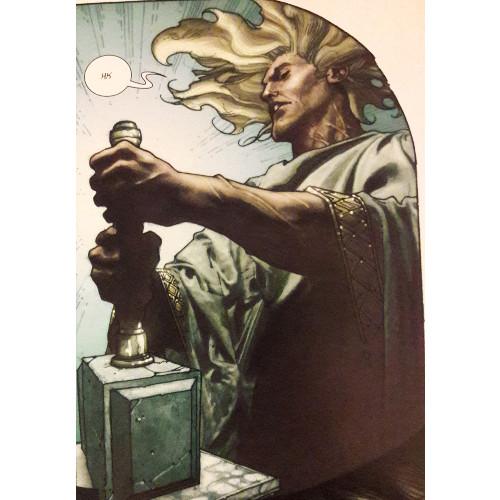
Occasionally, as with his dialogue, Rodi’s narratives become a tad tangled. Most egregiously, For Asgard teases an enigmatic enemy moving against Asgard from the shadows, and while the narrative ends with the promise of a grand revelation of this enemy's identity, the moment never occurs. Brief research indicates a sequel to For Asgard was planned but never published, which is disappointing. And while I absolutely appreciate Rodi’s attention to detail and his strong use of Norse mythology, he toys with certain concepts only lightly, never diving as deep as I would desire. For Asgard’s political turmoil is engaging, yet Rodi introduces too many other concepts and characters to keep it front-and-center; a newly introduced character attempts to embody the political dialogue raging in the background, yet their story closes with a slight whimper, not offering the deeper analysis that would have been nice to watch develop.
Artistically, Rodi’s partners-in-crime provide a whole swath of styles. Esad Ribic, penciling Loki, provides detailed, painted backgrounds and expressions, similar to his work with Jason Aaron on their “Gorr the God-Butcher” story arc; his work only reinforces the story’s sweeping, Shakespearean quality, with several panels feeling less at home in a comic and more appropriately situated framed on a wall. Simone Bianche plays well with space, always toying with For Asgard’s boundaries and creating a comic which does not feel constrained by borders. Mike Choi is perhaps my favorite artist of the bunch–his work feels the most “Marvel-centric,” as he crafts a space saga surrounding the Ego Brothers. Planets literally collide across the pages, and I could not help but visualize Alter Ego as a massive, ravenous PacMan as he attempts to eat his brother. Stephen Sergovia also leans heavily into the more traditional Marvel style, crafting visuals of the Eternals and Deviants beholden to Jack Kirby and Sal Buscema yet feeling at home within Sergovia’s more modern stylings.
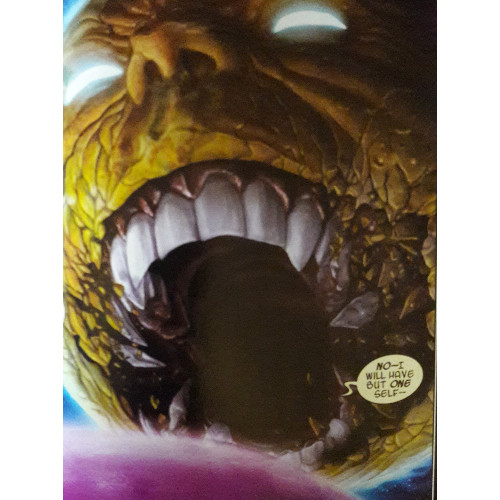
Though not a perfect volume–and, admittedly, perhaps not quite as enjoyable as Oeming’s contributions to Thor lore–Gods and Deviants is certainly worth checking out. This is a collection for fans who wish to see more of Thor’s mythological side and wonder what he does when he isn’t hanging out with the Avengers. A deep Loki arc, a surprisingly well-written saga centered on Ego the Living Planet, and well-constructed nods to Gaiman’s work on the Eternals and a continuation (somewhat) of his narrative help to balance out some of the disappointing aspects, even if I shall be left forever wondering which conspiratorial adversary remains lost in the shadows.